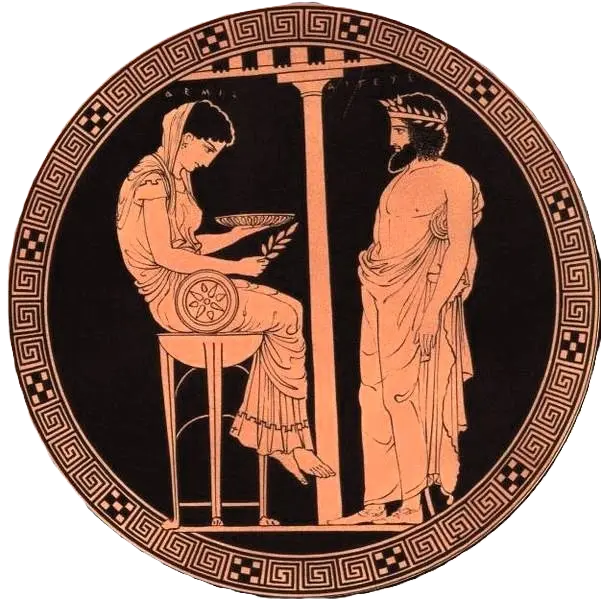The Oracle of Delphi and Today’s 'Yes or No' Oracles: A Historical and Symbolic Perspective

Since the dawn of civilization, humans have sought answers beyond rational understanding. They have tried to foresee the uncertain, know the future, and find guidance in moments of doubt. In ancient Greece, that quest had a powerful voice: the Oracle of Delphi. Today, even in a digital age, that need is still alive and manifests in new forms, such as modern 'yes or no' oracles. This article explores the legacy of the Oracle of Delphi and how its essence still resonates in contemporary oracles that seek to predict what is yet to come.
The Oracle of Delphi: Voice of Apollo
In the heart of ancient Greece, on the slopes of Mount Parnassus, stood the sanctuary of Delphi, considered the 'navel of the world' (the omphalos). There, the god Apollo spoke through the Pythia, the priestess responsible for delivering his messages. This place was not just a religious center; it was a hub of consultation for political, military, and personal matters. Kings, generals, and ordinary citizens came to the temple to receive guidance before making crucial decisions.
The Pythia would sit on a tripod over a chasm in the earth, from which — according to accounts — vapors emerged that induced her into a trance. In that state, she uttered ambiguous words, later interpreted by priests. This enigmatic character made the oracle powerful: it did not deliver absolute truths but visions open to interpretation.
A famous case was that of King Croesus of Lydia, who asked whether he should attack the Persian Empire. The oracle responded: 'If you cross the river, you will destroy a great empire.' Croesus took it as a sign of victory. However, the empire destroyed was his own. The oracle did not lie: it predicted the future, but with an ambiguity that demands interpretation and reflection.
The Role of the Oracle: Philosophical and Cultural Meaning
The Oracle of Delphi was not just a means of anticipating the course of events. Its role in Greek culture was deeply tied to self-knowledge and the limits of human understanding. The inscription 'Know thyself' (gnōthi seautón) adorned the temple's entrance—a reminder that beyond seeking answers about what had not yet happened, the oracle invited deep reflection on oneself.
Philosophers like Socrates interpreted this maxim as a call to inner examination. According to Plato, the oracle declared that no one was wiser than Socrates, precisely because he recognized his own ignorance. Thus, the oracle was not only an external voice, but a reflection of wisdom that must be discovered within.
Today’s 'Yes or No' Oracles
In modern times, oracles have changed in form, but not in essence. Today they appear as cards, pendulums, dice, digital apps, or specialized websites. Though labeled as 'yes or no,' they rarely offer a strictly binary response. Often, they respond with phrases like 'indeed,' 'not for now,' 'it’s likely,' or 'by no means.' This type of language preserves the ambiguity of the ancient oracle, allowing for an interpretation that is not rigid, but symbolic and open.
That ambiguity is not a flaw. On the contrary, it is what connects the oracle to the forces of destiny and intuition. The future is not always black or white. The oracle, then, acts as a channel between what is already in motion and what has yet to manifest fully.
Prediction, Symbolism, and Destiny
The most common mistake is to assume that an oracle, like any divinatory art, must provide absolute certainty. But what it truly offers is a vision of the energetic, emotional, and spiritual flow of the moment. It can suggest how a situation is aligning, where it’s heading, or what the symbolic probability of an outcome might be.
Symbolic language is the language of dreams, of the unconscious, of the soul. That’s why a response like 'All signs point to yes' is not a guarantee but a powerful sign. Intuitive people, or those who learn to listen closely, can find in that sign a glimpse of what’s to come.
Returning to the case of Croesus: the oracle told the truth. It was his interpretation, tinted by desire and ego, that led to his downfall. In this way, the oracle did indeed predict the future, but in its own language.
Why Do Oracles Still Exist?
Because we are still human.
We still experience fear, hope, doubt. We still want to know what lies beyond the next step. And although science has advanced tremendously, there are aspects of the human soul—and destiny—that cannot be calculated.
Oracles endure because they do not promise total control. They offer clues, not guarantees. Signs, not contracts. Their value lies in that unique mix of mystery, intuition, and ancestral wisdom.
Conclusion: The Oracle as a Spiritual Experience
The Oracle of Delphi spoke on behalf of the gods. Today, digital and symbolic oracles speak on behalf of something broader: destiny, the universe, energy, or the unconscious. Though the forms have changed, the intention remains the same: to predict what’s coming, understand the invisible, and anticipate the course of life.
'Yes or no' oracles do not oversimplify reality. On the contrary, they frame it in symbolic language that allows us to see it from a new perspective. Ambiguity is not weakness—it is a bridge toward interpretation and inner wisdom.
Remember that this experience is symbolic. It does not replace professional advice, but serves as a spiritual guide to help you connect with yourself.
And in that space where mystery touches the everyday, the oracle lives on — like a spark of ancient Delphi resonating in the digital age.